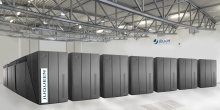 |
Country: Germany |  |
||
| Submit Testing/Consulting Request | ||||
Description: Jülich is an interdisciplinary, publicly funded research center with a staff of about 5.000 members working on the areas of health, energy and environment. One of the institutes at Jülich, the IEK5-Photovoltaik, concentrates its work on thin film silicon solar cells and related materials for several decades. Jülich Supercomputing Center JSC operates several high performance supercomputers. Access to on of these supercomputers is provided via Sophia trans national access.
Facilities:
Computing resources and modelling of solar cells
Description: The supercomputer facility is installed at and operated by Jülich Supercomputing Centre (JSC) which is one of the institutes of Research Centre Jülich. At present it has 95 staff and about 35 third-party funded members, provides supercomputer resources, IT tools, methods and know-how for the Research Centre Jülich and for more than 200 German and European projects. With JUGENE (100 Tflop) and JUROPA (2.5 T flop), the Forschungszentrum Jülich operates two of the largest supercomputers worldwide that are available to the general scientific community. Community- oriented support is provided by so-called Simulation Laboratories – domain-specific research and support units for different scientific communities. The newly funded German Research School for Simulation Sciences (GRS), a joint venture of Research Centre Jülich and RWTH Aachen University, offers programmes for master and doctoral students. Studies include all subjects relevant for simulation on high-performance computers ranging from the disciplinary sciences like physics, chemistry, or biology, to interdisciplinary fields like numeric and computer science.
last updated:02.09.2016
Forschungszentrum Juelich
